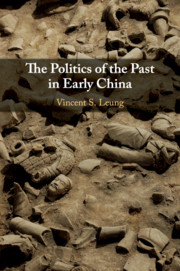Book contents
- The Politics of the Past in Early China
- The Politics of the Past in Early China
- Copyright page
- Dedication
- Contents
- Acknowledgments
- Introduction
- 1 Time out of Joint
- 2 A Parenthetical Past
- 3 Specter of the Past
- 4 The Rehabilitation of Antiquity in the Early Han Empire
- 5 Sima Qian’s Critical Past
- Epilogue
- Bibliography
- Index
- References
Bibliography
Published online by Cambridge University Press: 01 July 2019
- The Politics of the Past in Early China
- The Politics of the Past in Early China
- Copyright page
- Dedication
- Contents
- Acknowledgments
- Introduction
- 1 Time out of Joint
- 2 A Parenthetical Past
- 3 Specter of the Past
- 4 The Rehabilitation of Antiquity in the Early Han Empire
- 5 Sima Qian’s Critical Past
- Epilogue
- Bibliography
- Index
- References
- Type
- Chapter
- Information
- The Politics of the Past in Early China , pp. 181 - 197Publisher: Cambridge University PressPrint publication year: 2019



